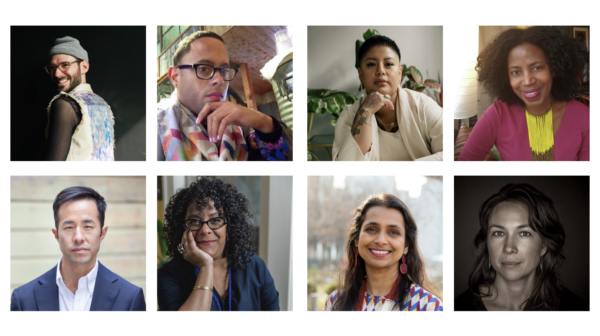
Creative Time’s First Think Tank Now Public
March 3rd, 2022
For the past year, the Think Tank has served as an incubator and forum for reframing conversations and decision making processes, premised on an understanding of arts and cultural spaces as necessary points of intervention toward wider societal transformation. Working amidst a groundswell of demands for change in response to the ongoing pandemic and uprising for racial justice and decolonization, the Think Tank coalesced around a vision of how to move past reactionary and reformist approaches—rooted in representational politics and the elevation of individual achievement over collective gain—and toward true systemic transformation guided in reparative practices that focus on collective well being. The culmination of this work can be found at: creativetime.org/reworlding
Invitations Toward Re-worlding can best be understood as a series of administrative interventions, directed by a central question: what does repair within our work look like? Members of the Think Tank were selected through an open-call process, with the eight member cohort, Che Gossett, Emily Johnson, Hentyle Yapp, Kevin Gotkin, La Tanya S. Autry, Namita Wiggers, Prerana Reddy, and Sonia Guiñansaca, contributing from a range of perspectives, disciplines, lived and professional experience. Invitations Toward Re-worlding, serves as a public resource and call to action to explore new modalities to replace existing systems of oppression within our institutions and communities more broadly.
“Creative Time is an organization committed to realizing the dreams of artists and ensuring that their work transcends traditional art world silos. Over the past few years we have been asking ourselves, how can we better embody our values in all the work that we do? How does the work transform when we approach even our administrative practices as an opportunity for artistry? In this spirit, the Think Tank has been an amazing opportunity to dive deep into our organizational practices—envisioning a future for the field and our position within it, while centering the labor and vision of cultural workers. As we look toward our 50th anniversary in 2024, we reaffirm our commitment to charging forward as a leader in challenging the status quo,” states Creative Time Executive Director Justine Ludwig.
Presented as a series of iterative “programming scores,” with an emphasis on the practice and implementation of new infrastructural forms, users of Invitations Toward Re-worlding may navigate an interchangeable constellation of ideas, prompts, and provocations, designed by Riley Hooker. Each score is indeed an invitation, to rethinking status quo logics, languages, and framing, and the recognition of administration itself as a site of change and transformation. Examples of the scores include Emily Johnson’s “Decolonization Rider;” Kevin Gotkin’s “score for x,” on holistic disability access integration; Che Gosset’s “Abolition Aesthetics;” and Prerana Reddy’s “Compositional Notes for Making a With/Against Institutional Budget,” for rethinking the budget-making process.
“For the past year, conversations with the Think Tank moved seamlessly and dynamically between scales of need, from the bodily, and the need for rest, access and wellness check-ins; to the industry, the need to thwart or recover from harm caused by art and academia and sometimes even organizing movements; and the structural, and the need for caring support systems, reparations and land back. Invitations Toward Re-worlding is born from these gatherings. It is a series of scores—administrative interventions—to be performed and enacted out loud in the everyday decisions and processes of artists, arts workers, and institutions, of all levels and sizes. We hope the Think Tank scores lead to more scores for rest, for transformation, for liberation,” Creative Time Associate Curator, Diya Vij, explains.
Creative Time Head of Programming, Alex Winters, elaborates on the Think Tank’s influence within the organization, “Creative Time as a presenter of public art has inserted art into public life for decades, and the provocation from the cohort has challenged us as an organization, and as a group of producers and arts workers, to look internally and assess how we have or haven’t been negotiating different social contracts with our neighbors and community in order to do our work, and shift from our work being in public to also being with the public.”
In response to its engagement with the inaugural Think Tank cohort, Creative Time is committing to this framework and ongoing self-examination of procedure and policy including immediately undergoing Decolonial Action Coalition’s institutional decolonial assessment, continuing to prioritize community-led safety and de-escalation services in place of the police, and use of the scores in the organization’s daily administration in creating budgets, contracting with artists, and commissioning new works. As the organization undertakes a phase of strategic planning over the coming year, the framework will continue to guide the conceptualization of Creative Time’s future and how it will participate in critical liberation movements, such as Indigenous and Black-led rematriation and reparation efforts.
Following the release of the cohort’s scores in Invitations Toward Re-worlding, Creative Time will invite additional respondents to publish on the site’s Reverb section, with new scores released over the coming months that emphasize the Think Tank’s call to action for evolving and collective action. Reverb will include responses from Eve Tuck, Miguel Gutierrez, Jen Delos Reyes, Tricia Hersey of The Nap Ministry, Dana Kopel, Guadalupe Maravilla, Art.Coop, and The Black School, among others.
Lead program support for the Think Tank was generously provided by the Open Society Foundations and Rockefeller Brothers Fund.
Images: Row 1: Kevin Gotkin, Che Gossett, Sonia Guiñansaca, La Tanya S. Autry; Row 2: Hentyle Yapp, Namita Gupta Wiggers, Prerana Reddy, Emily Johnson
